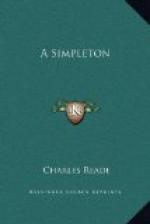The quarter-deck was hailed from the “look-out” with a cry that is sometimes terrible, but in this latitude and weather welcome and exciting. “Land, ho!”
“Where away?” cried the officer of the watch.
“A point on the lee-bow, sir.”
It was the island of Madeira: they dropped anchor in Funchal Roads, furled sails, squared yards, and fired a salute of twenty-one guns for the Portuguese flag.
They went ashore, and found a good hotel, and were no longer dosed, as in former days, with oil, onions, garlic, eggs. But the wine queer, and no madeira to be got.
Staines wrote home to his wife: he told her how deeply he had felt the bereavement; but did not dwell on that; his object being to cheer her. He told her it promised to be a rapid and wonderful cure, and one that might very well give him a fresh start in London. They need not be parted a whole year, he thought. He sent her a very long letter, and also such extracts from his sea journal as he thought might please her. After dinner they inspected the town, and what struck them most was to find the streets paved with flag-stones, and most of the carts drawn by bullocks on sledges. A man every now and then would run forward and drop a greasy cloth in front of the sledge, to lubricate the way.
Next day, after breakfast, they ordered horses; these on inspection, proved to be of excellent breed, either from Australia or America—very rough shod, for the stony roads. Started for the Grand Canal—peeped down that mighty chasm, which has the appearance of an immense mass having been blown out of the centre of the mountain.
They lunched under the great dragon tree near its brink, then rode back admiring the bold mountain scenery. Next morning at dawn, rode on horses up the hill to the convent. Admired the beautiful gardens on the way. Remained a short time; then came down in hand-sleighs—little baskets slung on sledges, guided by two natives; these sledges run down the hill with surprising rapidity, and the men guide them round corners by sticking out a foot to port or starboard.
Embarked at 11.30 A.M.
At 1.30, the men having dined, the ship was got under way for the Cape of Good Hope, and all sail made for a southerly course, to get into the north-east trades.
The weather was now balmy and delightful, and so genial that everybody lived on deck, and could hardly be got to turn in to their cabins, even for sleep.
Dr. Staines became a favorite with the officers. There is a great deal of science on board a modern ship of war, and, of course, on some points Staines, a Cambridge wrangler, and a man of many sciences and books, was an oracle. On others he was quite behind, but a ready and quick pupil. He made up to the navigating officer, and learned, with his help, to take observations. In return he was always at any youngster’s service in a trigonometrical problem; and he amused the midshipmen and young lieutenants with analytical tests; some of these were applicable to certain liquids dispensed by the paymaster. Under one of them the port wine assumed some very droll colors and appearances not proper to grape-juice.




